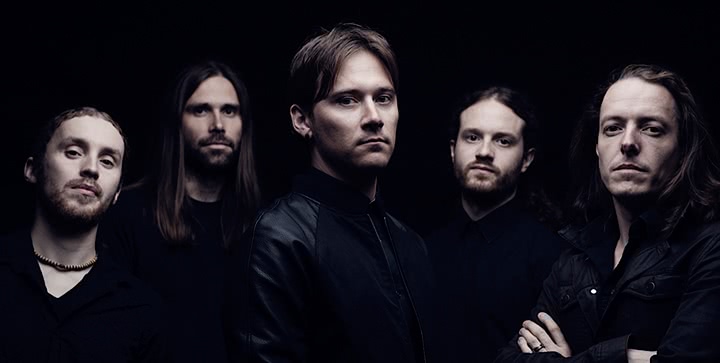Categorical labels are limiting for any creative endeavour. To be summarised in a word or two undercuts the effort and imagination put into a song or an album, for instance.
The metal scene, awash in subgenres, is a veritable label minefield for any band looking to define itself on its own terms. In the case of British outfit Tesseract, people have been trying to pin them down ever since they came into being over a decade ago.
Bass guitarist Amos Williams explains that Tesseract’s ability to avoid pigeonholing is down to a mix between the band’s restless nature and its organic exploration of – and experimentation with – genre.
“People expect the unexpected, so simple unpredictability would be expected,” Williams says. “With us, it’s more a case of letting the song dictate where it needs to go. We get feedback, rather than a need to force it a particular direction. It could go to extremes of soft or heavy. But honestly, we don’t know where it’ll go until we press ‘stop’ in the studio.”
Alongside the development of Polaris – the band’s third album and first with UK label Kscope – has come a high level of expectation from the fans, both in terms of musical adventurousness and emotional depth. Despite the pressure, years of experience have taught Tesseract how to keep outside influences from interfering with their creative process.
“It’s not conscious or at the forefront of our minds,” says Williams. “We’re definitely trying to hone a story, and I would hope that we’re getting better and better at our arts reflecting our realities. As much as we may have our public space to be inspired by, we try always to have inward reflection and let what we need to say come through in as pure a way as possible.”
While the Brits have had many emulators in the broader progressive scene, few have come to rival their natural creative fluidity – one that enables them to slip from one defining characteristic to another without allowing a label to stick. Williams puts it down to Tesseract’s organic songwriting and skills in sound experimentation.
“There’s no fixed way to do it. The best way is to get inspiration, to listen to everything going on in the world – especially music, in general, but even movies or books might give us ideas. If there was a formula, I’d say that sometimes we work backwards, which works for us because you create a pinnacle, and from there you know how you can build into it. That’s a way to keep things fresh, but it’s still not fixed.”
The risk and reward of experimentation fluctuates dramatically. With each stride along the boundaries of genre, Tesseract gamble with taking a step too far. But while such a feeling would paralyse some artists, Williams feels it’s a definitive signal of a band’s confidence with its own sound.
“It’s fine if people don’t like what we do. We’re not for everybody. But if we made a bad song, it would be our fault. When you’re touring and playing the same songs over and over and over, you need to be happy with it. It’s a punishment to make a song you’re not happy with just to please people, and it’ll drive you mad.”
With the release of Polaris, Tesseract are kicking off a six-month world tour in Australia, hitting Brisbane, Sydney, Melbourne, Adelaide and Perth in October. But the starting locations for the tour are more than just a happy coincidence.
“It’s always great going to Australia,” says Williams. “It’s energetic and the scene is pretty strong. When we put the tour together, Australia was always on the list, and we had to decide if we wanted to take the opportunity to go now or in 18 months’ time. We all said, ‘Let’s go now – kick the whole tour off on a high note!’ It seemed like a no-brainer when the tour came together.”
With excitement and anticipation for the tour building to fever levels, the band’s experience and maturity keeps things centred.
“Between the tours and the studio, you have to grab what time you can,” says Williams. “You need a break sometimes, if only to reconnect with family and friends. When you leave on tour, it all carries on without you. So you need to reconnect to keep grounded. It’ll be good to be back on the road, ride the energy amongst us all and get amongst our fans. You’ve got to take those moments where you can, otherwise they can just slip away. The thing we have to keep in mind is that all of this isn’t the be-all and end-all of life.”
Tesseract begin their Australian tour a month after Polaris’ scheduled release this week. Bearing such an indefinable sound in the metal genre, Williams laughs when asked how to describe Tesseract to potential new listeners.
“Keep an open mind and I’ll bet you you’re going to hear something different on each playthrough,” he says, still trying to avoid any labels. “We put a lot of effort into our music and we’d hope each listen reveals something new to you.”
Polaris is out Friday September 18 through Kscope/Rocket, andTesseract rock theFactory Theatre onThursday October 15, with Caligula’s Horse and Plini.


































